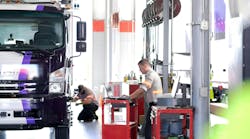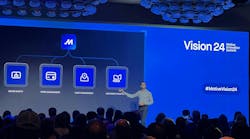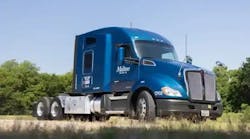The teams that compete on the Busch and Winston Cup circuit rely on customized tractor-trailers to transport two race cars, tools, tires, and a host of other supplies to 36-38 races per-year, plus another seven test track events. The end result is that the 43 stock car teams on each circuit are out on the road approximately 45 weeks a year, with 18-wheelers their only link between each venue.
International Truck & Engine Corp. embarked on a $2 million annual NASCAR sponsorship program last year that included the creation of a competition to recognize the unique impact truck drivers have on NASCAR. The International Truck Challenge is a four-race series that tests the skills of the NASCAR teams' tractor-trailer drivers maneuvering an International 9400i tractor and trailer though an obstacle course as fast as possible with a minimum of mistakes. A $1,000 check is awarded to the winner of each stage, followed by a $25,000 grand prize to the best cumulative time score over the four events.
Stock car racers past and present say the event has cast a much-needed spotlight on the unsung job NASCAR team tractor-trailer drivers do.
"Before this event, I really didn't pay too much attention to what these drivers do for the stock car teams," said Glenn Jarrett, a veteran racer and NASCAR announcer. He is the older brother of Dale Jarrett, a Winston Cup champion who drives for Robert Yates Racing. Dale also serves as a spokesman for International.
Tommy Mullins, who is the truck driver for Dale Jarrett's Number 88 stock car team, said that driving the tractor-trailer is actually the easiest part of the job.
"The work really starts at the race track," Mullins said. "Getting ready for race day is the hardest part."
He explained that stock cars must go through three inspections before each race, with plenty of test runs and tinkering done before the competition begins. Mullins, currently 21st in the truck competition, has been driving for NASCAR teams for 17 years.
It all adds up to long hours on the road spent away from friends and family, added Glenn Jarrett.
"It's not a glamorous life at all," he said. "You are gone for weeks at a time and that gets tough. That's why NASCAR crews rely so much on each other. It's your family on the road." Mullins said they have to be like a family, because any kind of road emergency can jeopardize a team's ability to compete.
A Winston Cup team will spend roughly $20 million to support two cars, engines, personnel, and supplies each year; cars alone $125,000 a piece, said Glenn Jarrett. For that amount, Winston Cup teams compete for $3 to $4 million in prize money, with drivers getting a 45% to 50% cut of winnings and the crew getting the rest.
That's why the truck drivers support each other on the highway, even though their teams compete fiercely on race day. Without those cars in place, no one has a shot at winning, Mullins said. "If you ever break down on the road, there's a good chance that 10 NASCAR team trucks will be right behind you to get you going again," he said. "We look after one another out there."


